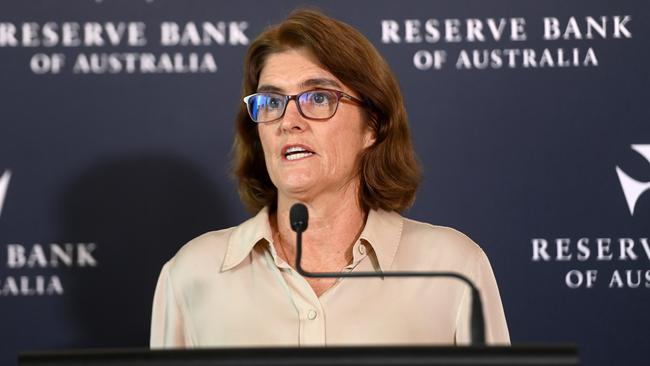McCrann: Why rate override power must go
The one proposed change to the RBA that should be entirely uncontroversial is the ending of the government’s ability to overrule an interest rate decision.

Terry McCrann
Don't miss out on the headlines from Terry McCrann. Followed categories will be added to My News.
The one proposed change to the Reserve Bank that should be entirely uncontroversial is the ending of the government’s - entirely academic - ability to overrule an RBA interest rate decision.
Yet it has received strong - and public - opposition from two former RBA governors, Bernie Fraser and his successor Ian Macfarlane, along with former treasurer Peter Costello.
The two most recent governors before the current one Michele Bullock – Glenn Stevens and Philip Lowe – have not entered the fray.
Bullock in turn has appropriately, and sensibly, said she’s ”agnostic”.
I would add, that it’s really like an argument over “how many angels can fit on the head of a pin”.
I also invite the trio of Fraser, Macfarlane and Costello to note who’s standing with them: the lunatic Dark Greens and the head of the far, far left Australia Institute, Richard Dennis.
If they are opposed to something, any rational person with an IQ north of 80 has to be in favour.
Now, the power has been in the RBA Act since its formation in 1959. It has never been used.
And never would be, for the very simple reason that it would trigger the mother - sorry, mothers, plural - of economic, financial and political crises, the likes of which we have never seen before.
Not even the 1975 Dismissal - or the GFC - would come close.
So, yes, with one very disturbing qualification, I would accept that it doesn’t really matter either way; just as it hasn’t mattered in the 63 years of the RBA’s existence to date.
That qualification is precisely if we did have a Dark Green-Labor government; and it wanted to order the RBA to - using today’s numbers for illustration - cut its policy interest rate to, say, 1 per cent.
So, on balance, I’m with Treasurer Jim Chalmers, to have it out. Safety first.
Of course, if we ever did end up with that Dark Green-Labor government, quite probably the least of our worries would be what they might try to force the RBA to do with interest rates.
The overrule power is actually a complicated process. It’s not just a future Chalmers ringing up a future Bullock and saying: no, do this.
It was put in the legislation, setting up the RBA, in a very different world.
A world where the RBA was effectively a branch of Treasury, and government (and Treasury) made all the decisions anyway.
Anyone much under 60 would not begin to believe how total and intrusive those decisions were.
What interest rates banks could pay and charge, on everything. How much they could lend. All the exchange rates; and how much foreign currency you could take out of the country. And on and on.
Now the RBA - Covid panics aside - has one decision: the official cash rate.
As for that, Wednesday’s inflation numbers - coming after the February jobs surge and the government’s support for a 4 per cent-plus national wage rise - were anything but indicative of a rate cut anytime soon.
Never did an RBA governor say a truer couple of words: Bullock not ruling anything in. Or out.
Originally published as McCrann: Why rate override power must go



